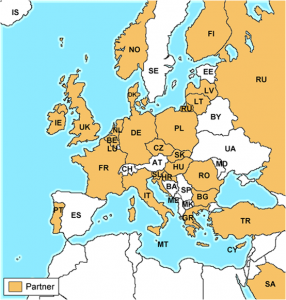The e-Bug project is led by Public Health England’s (PHE) Primary Care Unit in England and involves a consortium of 28 international partner countries.
The main aim of the project is to educate children and young people across the globe, at junior and senior school level, about microbiology, hygiene and the spread, treatment and prevention of disease. e-Bug also aims to reinforce an awareness of the benefits of prudent antibiotic use and how inappropriate use can have an adverse effect on antibiotic resistance in the community. The areas of hand and respiratory hygiene and spread of infections in the community are also covered, including teaching how to wash hands most effectively.
The e-Bug resources comprise of a teacher and student educational pack reinforcing an awareness of essential hygiene and antibiotic issues through detailed interactive lesson plans and an interactive website hosting complementary games, interactive quizzes, disease fact sheets and much more.
Website: http://www.e-bug.eu/
AIMS
- To reduce the incidence of antibiotic resistance across Europe by educating the future prescribers and users on prudent antibiotic use
- To compliment national antibiotic and hygiene educational campaigns
- Exchange information and experience of good practice within the educational curriculum with European partner countries
- Translate and implement the e-Bug resource across Europe in close collaboration with local Ministries of Health and Education
PARTNERS
The e-Bug team is made up of dedicated, experienced and knowledgeable people from public health and education in each partner country. Each of these individuals are driven by the common aim of promoting key health and hygiene messages to their children and young people by implementing the e-Bug resources across their country.
The initial e-Bug consortium consists of 10 associated EU partner countries (316 million) covering 61% of the EU population with the highest antibiotic use and those with large populations, thus obtaining education amongst a high percentage of high antibiotic user countries. These include: France, England, Belgium, Spain, Poland, Czech Republic, Italy, Denmark, Portugal and Greece.
Collaborating countries (Croatia, Finland, Hungary, Latvia, Lithuania, Ireland, Slovakia, Slovenia) (37.5 million) cover a further 7% of the European population and have been involved in the development of the e-Bug resource. In total, this initiative will reach 68% of the European population.
Belgium / Bulgaria / Croatia / Czech Republic / Cyprus / Denmark / Finland / France / Germany / Greece / Hungary/ Ireland / Italy / Latvia / Lithuania / Norway / Poland / Portugal / Romania / Russia / Slovakia / Slovenia / Spain/ The Netherlands / Turkey / United Kingdom / International: Saudi Arabia
 Κυπριακό Κέντρο Περιβαλλοντικής Έρευνας & Εκπαίδευσης – Κυκπεε
Κυπριακό Κέντρο Περιβαλλοντικής Έρευνας & Εκπαίδευσης – Κυκπεε




